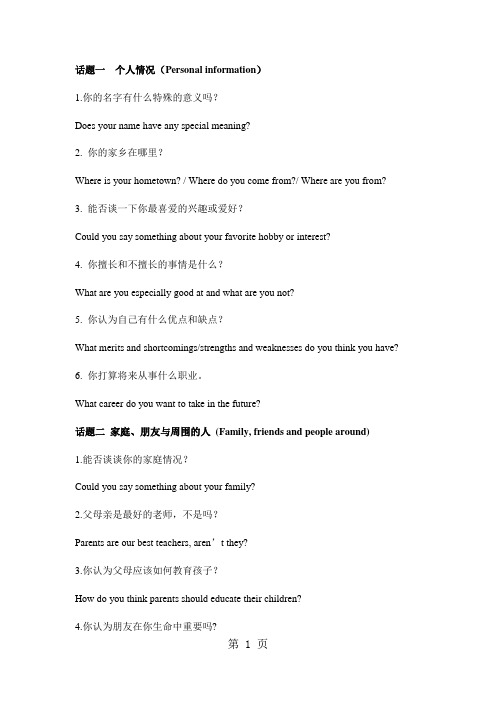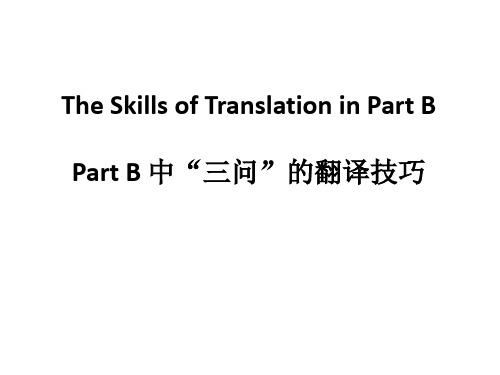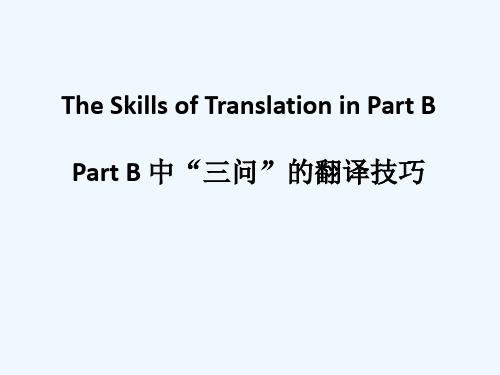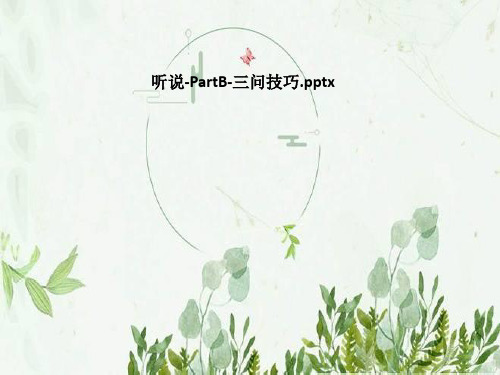听说考试角色扮演之三问讲义
- 格式:ppt
- 大小:2.93 MB
- 文档页数:51


话题一个人情况(Personal information)1.你的名字有什么特殊的意义吗?Does your name have any special meaning?2. 你的家乡在哪里?Where is your hometown? / Where do you come from?/ Where are you from? 3. 能否谈一下你最喜爱的兴趣或爱好?Could you say something about your favorite hobby or interest?4. 你擅长和不擅长的事情是什么?What are you especially good at and what are you not?5. 你认为自己有什么优点和缺点?What merits and shortcomings/strengths and weaknesses do you think you have?6. 你打算将来从事什么职业。
What career do you want to take in the future?话题二家庭、朋友与周围的人(Family, friends and people around)1.能否谈谈你的家庭情况?Could you say something about your family?2.父母亲是最好的老师,不是吗?Parents are our best teachers, aren’t they?3.你认为父母应该如何教育孩子?How do you think parents should educate their children?4.你认为朋友在你生命中重要吗?Do you think friends play an important part in your life?5.你通常是怎样结交朋友?How do you usually make friends?6.你认为在网上能结交到真正的朋友吗?Do you think it is possible to make real friends online?7.你是否和室友和谐相处?Are you getting along well with your roommates?话题三周围的环境(Personal environments)1. 你目前是否住学校宿舍。




Role play就是三问五答,三问中译英考查的是瞬间翻译造句能力。
I.中译英翻译步骤如下:找出三问句子中的中文关键词,套用哪种句型,时态语态,助动词和疑问词的选择。
范例如下:一、意味着, 是什么意思=mean1. 特殊疑问句1) 2011B, 你说的学习风格是什么意思?What do you mean by learning styles?2) 2011E, 你什么意思呢?What do you mean?3) 2016C, 那是什么意思呢?What does that mean?/ What do you mean?4) 2017A, 那是什么意思呢?What does that mean?/ What do you mean?5) 2018D, 那是什么意思?What does that mean?/ What do you mean?6) 2019D, 慢旅行”是什么意思?What does “slow travel”mean?2. 一般疑问句1) 2018A, 那意味着我们应该多睡觉吗?Does that mean we should sleep more?2) 2018C, 那意味着我们可以穿任何衣服吗?Does that mean we can wear any clothes?二、有=there be=have/has1. 某处有某物=there be sth +定语(介词短语等)某处有某物吗?=Are there any sth +定语(介词短语等)某处还有某物吗?=Are there any other sth +定语(介词短语等)1) 2016D, 有什么成功的秘诀吗?Are there any secrets to success?2) 2018A, 睡眠好还有其他什么好处吗?Are there any other benefits of good sleep?3) 2018D,这栋大楼里还有其他新设计吗?Are there any other new designs in this building?2. 某人有某物=sb have/has sth. Do you have any +sth+定语(介词短语等)?你有某物吗?=Do you have any+sth+定语(介词短语等)?你还有某物吗?=Do you have any other+sth+定语(介词短语等)?1) 2016D, 你有什么成功的秘诀吗?Do you have any secrets to success?2) 2011A, 你还有别的困难吗?Do you have any other problems?3) 2013D,你们晚上有哪些活动?What activities do you have in the evenings?What are your evening activities?主谓宾和主系表4) 2015C, 好老师有什么特点?What features do good teachers have?5) 2016E, 他们在行为上有什么差异?What differences dothey have in their behaviors? What are the differences in their behaviors?6) 2017A, 你有很多空闲时间旅游吗?Did you have a lot of free time for traveling?7) 2017C, 你有什么建议给家长呢?What advice do you have for parents? What is your advice for parents?8) 2017D, 网络医生看病的弊端是什么?What are the disadvantages of seeing an e-doctor?(同义)网络医生看病有哪些弊端?What disadvantages doesit have to see an e-doctor?9) 2018B, 你们有哪些活动?What activities do you have?二、某人/物是怎样的?=what is sth like?=how is sth?用来询问别人的看法1) 2016A, 在大家庭中成长是怎样的?What was it like growing up in a big family?/ How is growing up in a big family?2) 2016B, 你12岁时,学校是怎样的?What was theschool like when you were twelve?/How was the school when you were twelve?3) 2017E, 丝绸工业的现状是什么?What is the silkindustry like now?What’s the current situation of silk industry? =How is the current situation of silk industry?三、不=助动词+not1) 2012A, 为什么你不直接与他们谈一谈?Why don’t you have a talk directly with them?2) 2012B, 我为什么不能与朋友们一起开车?Why can’t I drive with my friends?3) 2014F, 为什么你不买些京剧DVD作为礼物?Why don’t you buy some Beijing Opera DVDs as gifts?4) 2014E, 你不是说你想当一名语言教师吗?Didn’t you say you wanted to be a language teacher?5) 2015F, 穿同样的衣服不烦吗?Isn’t it boring to wear the same clothes?Don’t you feel bored to wear the same clothes?四、情态动词引导的疑问句1. 能/可以=could/can, Could you do sth?2011B, 你能再多说点吗?Could you please speak a little more?2011C, 你能说说英国人吗?Can you talk about English people?2012D, 我一次可以借几本书呢?How many books can I borrow at one time?2012D,我可以借多长时间呢?How long can I keep the books?2017F, 为什么运动能使我们更聪明?Why can sports make us smarter?2. 应该/该/要=should2011D, 那我该做什么呢?What should I do?2011D,我还需要(该)注意什么吗?What else should I pay attention to?2013E, 我去别人家吃饭时,我要(应该)带些什么?What should I take if I go to others’house for dinner?2013F, 我应该知道的下一个重要事情是什么?What is the next important thing I should know?2013F, 如果我不记得某一个英语词,该怎么办呢?What should I do if I don’t remember an English word?2017B, 如果我们被机器人取代了该怎么办?What should we do if robots take place of us?2018A, 那意味着我们应该多睡觉吗?Does that meanwe should sleep more?五、HOW系列1. How=如何,怎样=in which way,以……的方式2012A, 你和你的室友相处得如何?How do you get along with your roommates?2012C, 报纸怎么评论这本书?How do the newspapers comment on this book?2012E, 你是如何发展出对历史的兴趣的?How do you develop an interest in history?2013A, 将来学生如何参加考试?How will students take exams in the future?2013B, 作为领导,我应该怎样对待团队成员呢?How should I treat my teammates as a leader?2013F, 我怎样才能留下良好的印象呢?How can I leave a good impression?2014A, 颜色怎样影响我们的购买行为?How do colors affect our buying decisions?2014B, 你们怎么解决老人的健康问题?How do you solve old people’s health problem?2014D, 你们是如何训练这些狗的?How do you train these dogs?2014E, 你第一天教课感觉如何?How do you feel the first day of teaching?How was your first day of teaching?2015B, 颜色怎样影响我们的情绪?How do colors affect our moods?2015G, 大学课程是怎样安排的?How are the university classes arranged?2016C, 作为老师,你怎样使用这个系统?How did you use the system as a teacher?2016E, 你怎么知道女性在学习语言方面做得更好?How do you know that women can do better in learning languages?2017D, 那个医生是如何帮助你的?How did the doctor help you?2017E, 中国丝绸如何传播到其他国家?How did/was Chinese silk spread to other countries?主动/被动2017F, 你怎么知道的呢?How did you know that?2017F, 运动如何帮助提升我们的课堂表现?How do sports help us improve class performance?2018A, 学生是如何受到睡眠影响的?How does sleep have an influence on students?主动语态How are students affected by sleep?被动语态。